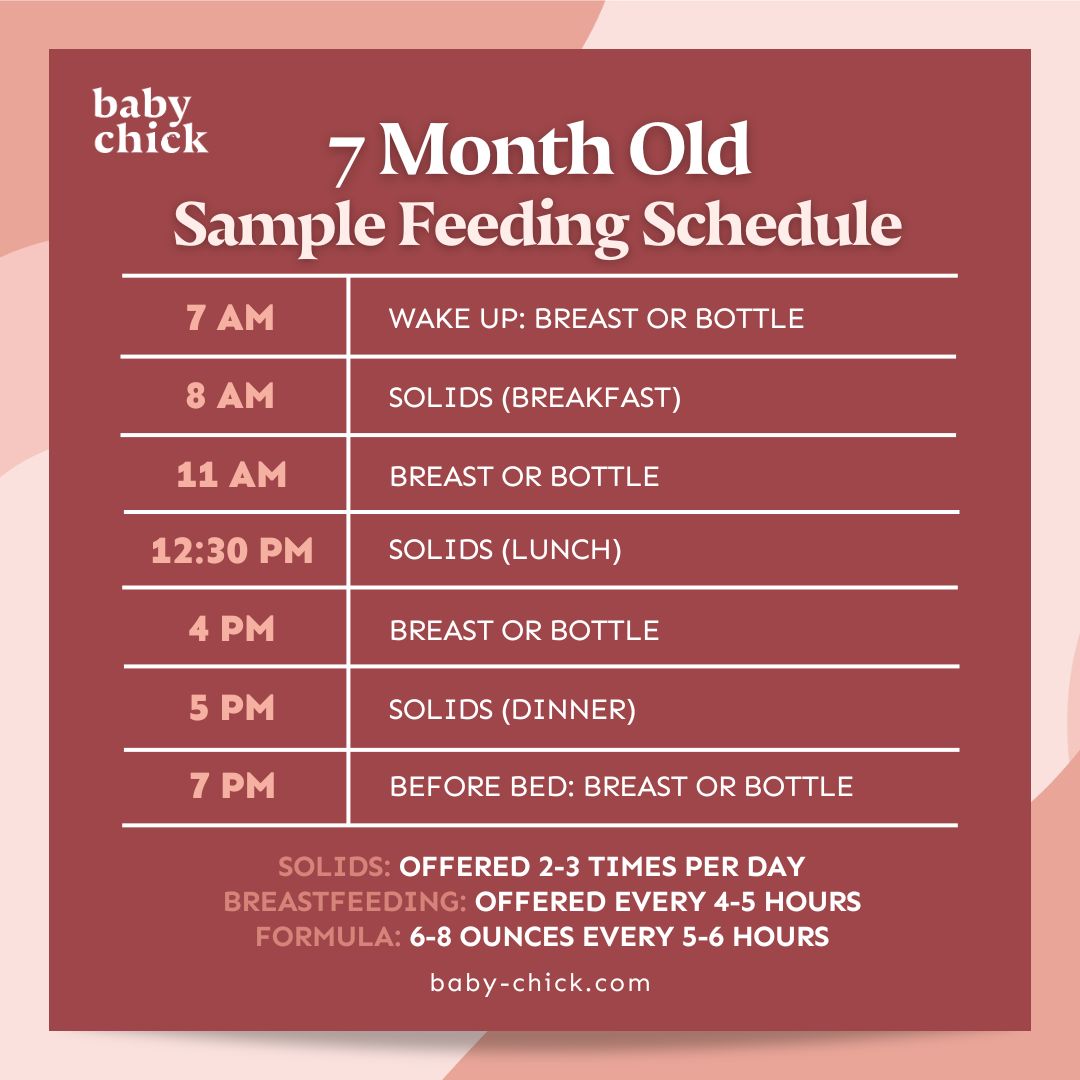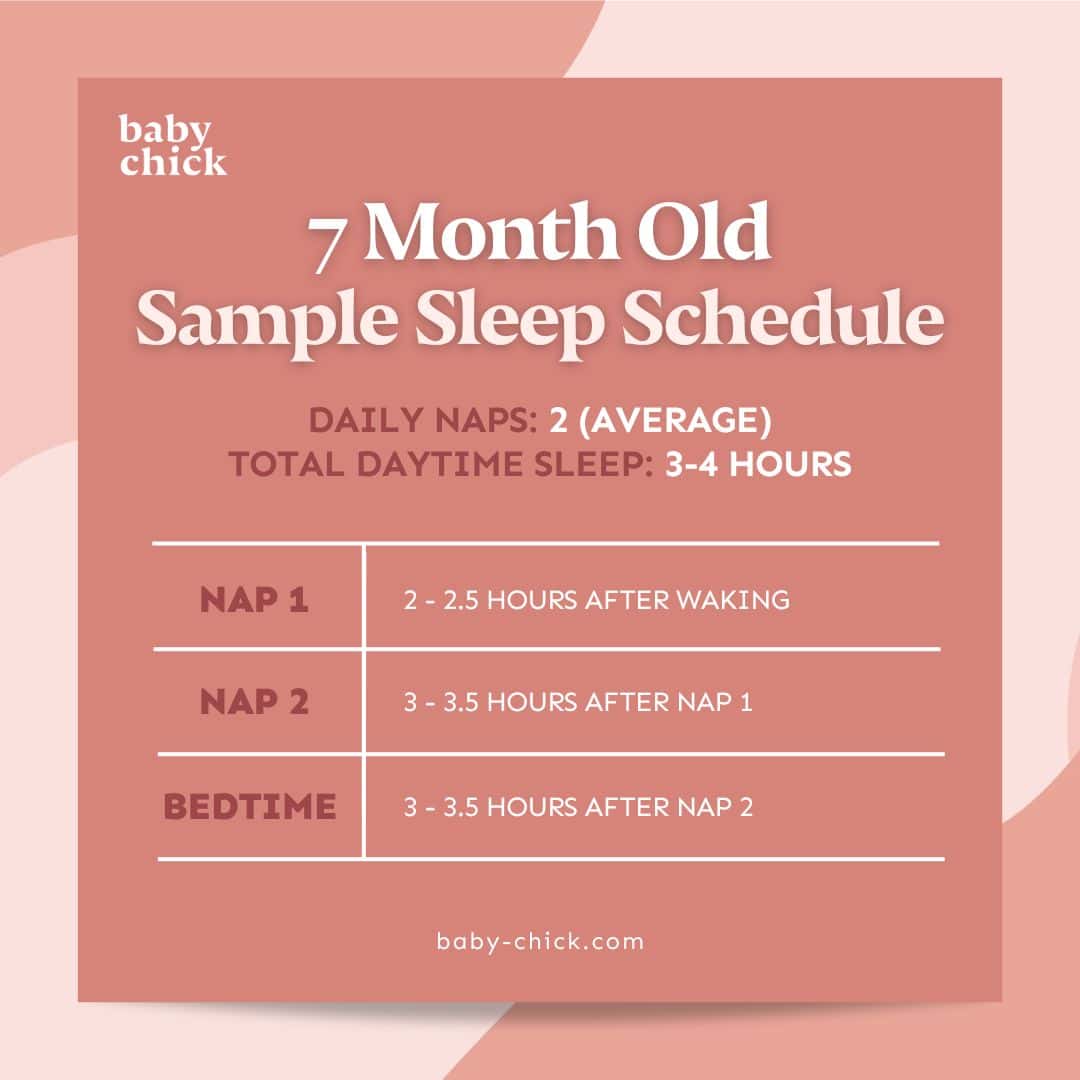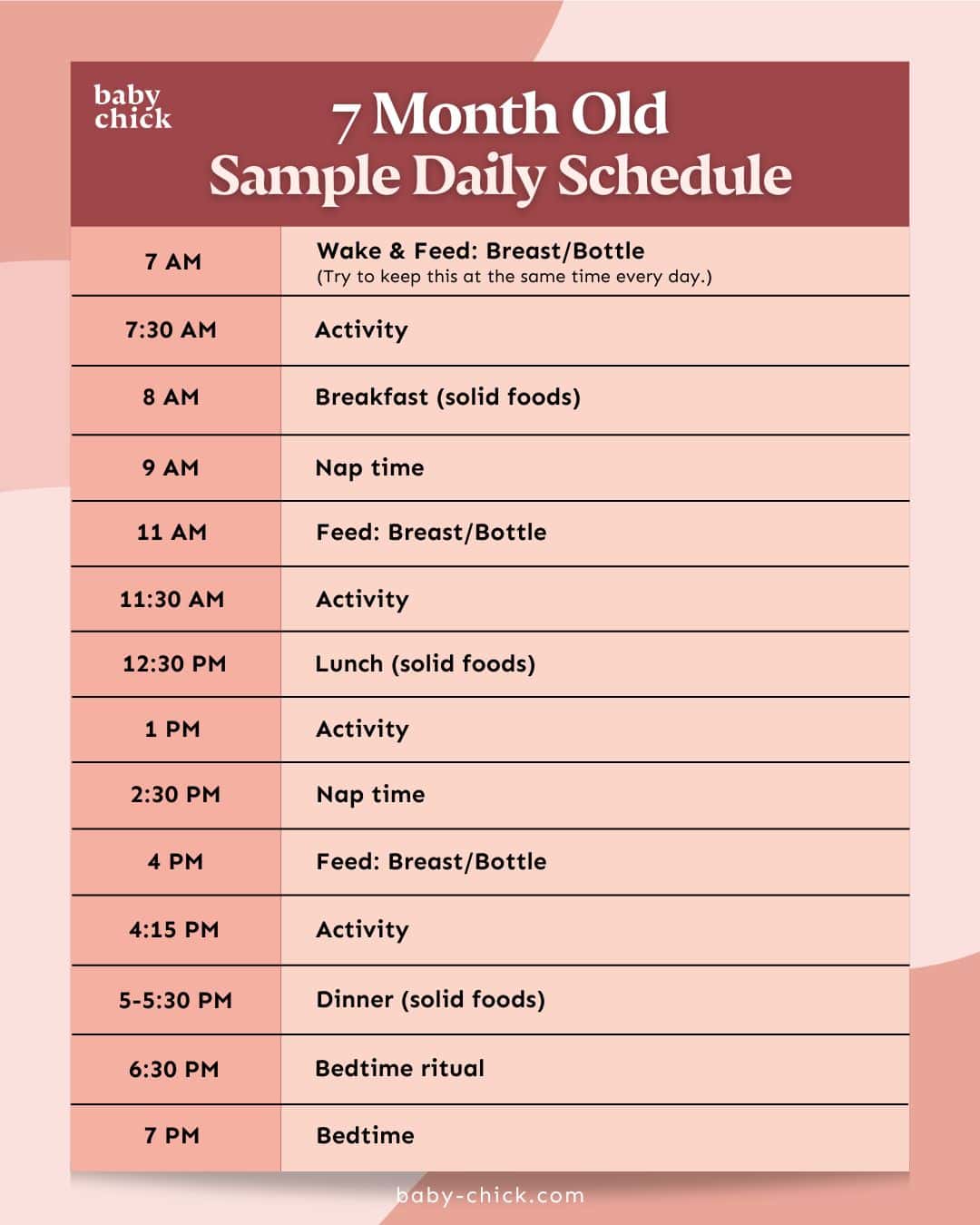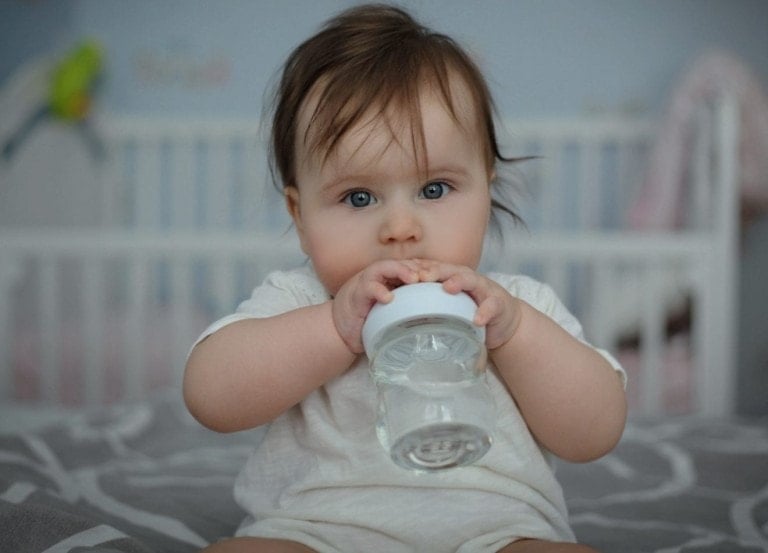These first seven months of your baby’s life have flown by, and you may wonder what happens next. This article will lead you through your 7-month-old baby’s new developmental milestones and their new feeding patterns. You’ll also learn how much sleep your 7-month-old needs, including what to know about their wake windows and sleep regression. In addition, you’ll discover new and exciting ways to interact with your little one, all while keeping them safe from injury. So, buckle up — this new month of development is about to take off!
7-Month Developmental Milestones
Your baby is becoming increasingly more active every day, and their mobility skills are starting to flourish. They are also beginning to expand how they interact with their environment. Some new development milestones you can look forward to your 7-month-old reaching include:1
- Rolling from back to front and then back
- Sitting without the support of their hands while still requiring external support
- Reaching for toys or food using one hand
- Transferring toys or food from one hand to the other
- Improving in their ability to track objects
- Having fully developed and mature eyesight
- Responding to their name and the word “No”
- Enjoying babbling and engaging in social play
- Identifying emotions by the tone of someone’s voice
7-Month-Old Feeding Schedule

During this time, your baby will love exploring different foods and start eating solid foods more frequently. They will begin to gradually eat solid foods three times per day plus additional feeds of breast milk or formula. Providing a variety of veggies, fruits, pasteurized dairy, and proteins (such as eggs) will help ensure your baby is exposed to a wide range of nutrients. These foods can be served mashed, pureed, or softly cooked.2
Avoid foods with a high risk of choking, including hot dogs, uncooked veggies, grapes, popcorn, and nuts. Other foods to avoid are honey, unpasteurized juice and dairy, and high sodium, no-calorie sweeteners.3 Infants should also not have cow’s milk until they’re 12 months old due to the risk of iron-deficiency anemia.13
While your 7-month-old may reach the milestone of eating more solid foods, most of their nutrients will still come from breast milk or formula. Babies have small stomachs, so to ensure they get enough milk, offer them their bottle about an hour after solid foods.2 Providing iron-fortified baby cereals is a great way to add nutrients to your baby’s diet; however, it is not advised to add the cereal to your baby’s bottle unless their pediatrician instructs you to.3
Food Allergies
It is vital to offer only one new feed at a time with several days in between before introducing another new food. This allows you to determine if your baby may not tolerate the new food. Some signs and symptoms to watch for in a potential food allergy include:3
- Rash
- Bloating
- Diarrhea/vomiting
- Trouble breathing
- Hives
If your baby is experiencing trouble breathing or a rapidly progressive full-body rash, seek immediate medical attention. If you believe your baby may have a less severe food allergy, be sure to contact your pediatrician and ask about next steps.
While people used to believe that waiting to start high-allergen foods (such as wheat, soy, eggs, milk, and peanuts) would reduce the risk of an allergic reaction, the opposite is true. Waiting to start these foods may increase the risk of food allergies.3 It is recommended to offer high-allergen foods as soon as your baby begins eating solids, one at a time.
7-Month-Old Sleep Schedule

You may also be wondering how much sleep a 7-month-old typically needs. As your baby becomes more active, their sleep pattern will change. 7-month-olds need 12-16 hours of sleep daily, including two daily naps that average one and a half to two hours each.4
Even though your baby may have been on a good sleep schedule last month, at 7 months old, they may experience a period of sleep regression. Sleep regression is a change in your baby’s sleeping pattern that includes difficulty going back to sleep and staying asleep. If your 7-month-old is experiencing sleep regression, they may nap for shorter periods, be increasingly fussy, or have a change in their appetite. Sleep regression typically lasts two to six weeks.5
A wide variety of changes can cause sleep regression in your 7-month-old, but the most common reasons for sleep regression include:5
- Pain from teething
- Reaching a new developmental milestone
- Growth spurt
- A change in their routine
- Travel
- Illness
Sleep regression can be a difficult time for parents and babies alike, but there are some ways to help your 7-month-old baby, including:5
- Keeping a consistent bedtime and bedtime routine
- Recognizing your baby’s sleep cues and putting them to bed at the first sign of tiredness
- Allowing your baby a few minutes of fussiness while they are falling asleep if you feel comfortable doing so
Daily Schedule

Sticking to a consistent daily schedule during this sleep regression period is essential. That includes having consistent wake times, nap times, and bedtimes. Many 7-month-olds will still take two naps daily and have wake windows of around two to three hours each.6 Each baby’s wake time and bedtime will look different, but here is a sample sleep schedule to help give you an idea:6
- 7 a.m.: Wake up
- 9-9:30 a.m.: First nap of the day (one to two hours)
- 2-2:30 p.m.: Second nap of the day (also one to two hours)
- 7-8 p.m.: Bedtime routine
It is recommended not to allow your baby to sleep later than 4 p.m. during their second nap, as that can cause them to have a more challenging time falling asleep at bedtime. Aiming for a bedtime 10-12 hours before your baby typically awakens for the day is also recommended. This will help ensure your baby gets enough sleep.6
Health Concerns to Watch Out For
Typically, there are no scheduled well-baby checkups or routine vaccinations at this age, as long as they have had regular checkups and vaccinations through 6 months old. But that doesn’t mean there aren’t a few things to look out for, including development concerns and common illnesses your baby can experience.
Development Concerns
In addition to tracking your 7-month-old’s developmental milestones, monitoring for any developmental concerns is important to provide needed interventions early. Some things to watch out for are:1
- They have stiff or tight muscles
- They appear floppy or have very loose muscle tone
- They are unable to support their head
- They refuse to cuddle or do not show affection or interact with their caregivers
- One or both of their eyes turn inward or outward
- They cannot roll over or sit with support
- They do not respond to sounds around them
If your baby shows any of these signs, inform their doctor of your concerns. They will be able to direct you on the next steps you may need to take.
Common Illnesses
Your baby will put everything, and I mean everything, in their mouth. This almost guarantees they will become sick. Some of the most common illnesses your little one will experience include:8
- Colds with a runny nose, sneezing, congestion, and cough
- Diarrhea and vomiting caused by viruses
- Ear infections
- Hand-foot-mouth disease, where sores develop in the mouth, the palms of the hands, and the soles of the feet
You can monitor and treat many of these illnesses at home. Still, it is vital to seek immediate medical help if your baby is experiencing any of the following symptoms:8
- Fever lasting longer than three days
- Ear pain
- Difficulty breathing
- Change in attitude, such as increased irritability or lethargy
- Dehydration (cracked lips, decreased wet diapers, and decreased tears)
Even though no routine vaccines are needed at this age, if your baby is 7 months old during cold and flu season, it is important to consider getting them an influenza flu vaccine. This vaccine should be administered by the end of October to protect your little one from the flu for the entire season.7 The COVID vaccine is also recommended for all those 6 months and older.14
Activities for 7-Month-Olds

Now that your baby is starting to interact with you and their environment, playtime will become even more special for both of you. Playtime will mainly focus on social interactions and exploration. Here are some ways you can engage with your baby throughout the day:9,10
- Sing fun songs and include actions for your baby to mimic
- Provide toys in various shapes, sizes, colors, and textures
- Play peek-a-boo
- Provide toys that move or make noise when your baby interacts with them
- Place a toy just out of their reach for them to grab
- Read to your baby daily
Safety Tips
As your baby becomes more active and mobile, it is essential to maintain a safe space for them to play in. The following tips will give you a framework to build on when creating a safe environment for your baby:11,12
- Remove all small objects from their reach
- Place gates on stairways
- Place window guards on all windows
- Move their crib away from any windows
Other ways to keep your baby safe include:12
- Not keeping hot foods or beverages within their reach
- Not leaving them unattended in the bathtub
- Removing all water from the tub after bath time is over
- Using a properly installed rear-facing car seat in all vehicles
- Covering sharp corners
- Making sure all cords are out of reach
- Securing doors, drawers, and cabinets with safety locks
- Covering electrical outlets
- Securing furniture to the wall
- Putting medicine, cleaning products, and any other potentially poisonous/hazardous materials out of reach and locked away
Watching your little one enter this new life stage is exciting and rewarding! Your 7-month-old will be reaching new milestones and experiencing shifts in their sleep, feeding, and more. This journey will bring joy, love, and amazement as you watch your baby grow. Embrace the daily adventures and the snuggles, as this is a special time for you and your baby.
































